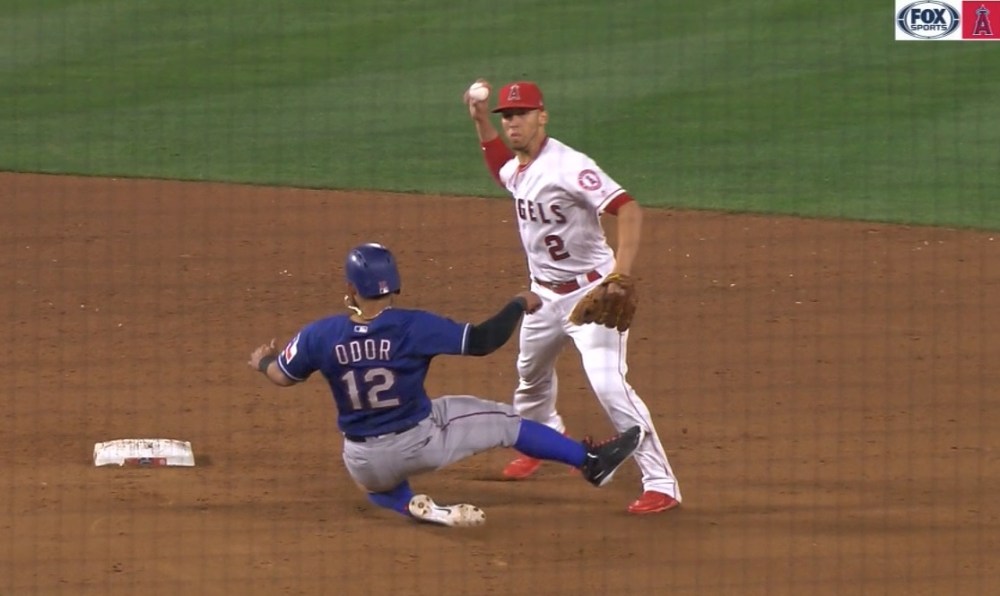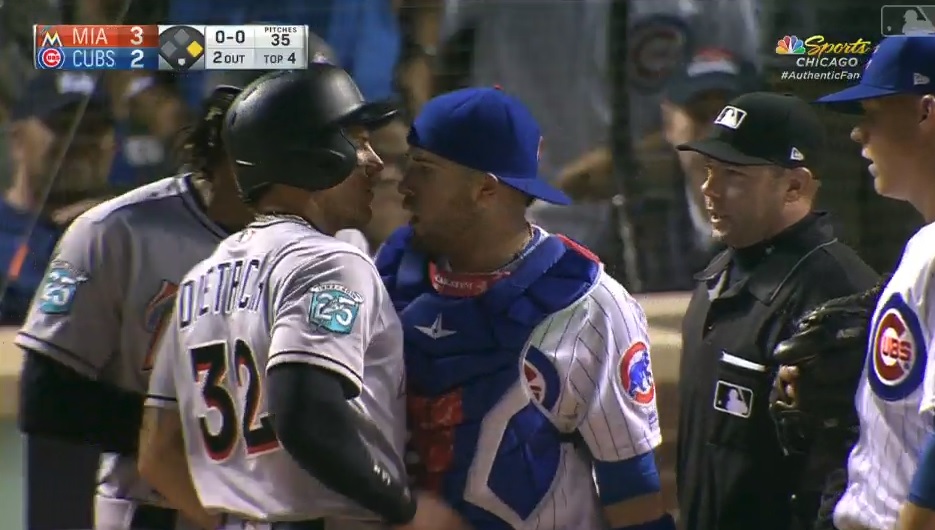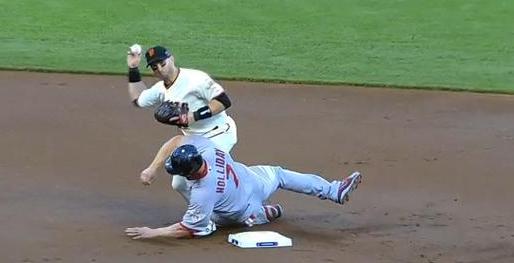 Who’d have guessed that the primary unwritten-rules-related topic of Major League Baseball 2018 wouldn’t be bat flips or even retaliatory pitches, but guys sliding into bases? In the modern world of fielder safety, we’ve reached the point that players are managing to get offended even on properly executed slides.
Who’d have guessed that the primary unwritten-rules-related topic of Major League Baseball 2018 wouldn’t be bat flips or even retaliatory pitches, but guys sliding into bases? In the modern world of fielder safety, we’ve reached the point that players are managing to get offended even on properly executed slides.
First case in point: Last Friday in Milwaukee, the slide of Brewers infielder Eric Sogard was cut off prematurely when Cardinals shortstop Yairo Munoz, shifting over to field the throw, impeded his progress. It was a clean play all around—these things sometimes happen—yet feelings nonetheless managed to get scuffed. Sogard got up talking (“The first words that came out of my mouth,” he told reporters after the game, “were ‘are you all right?’ “), Munoz got up angry, and within moments the benches had emptied.
 Then on Tuesday, Pittsburgh’s Josh Harrison slid forcefully into second base, upending Mets second baseman Asdrubal Cabrera. The slide was legit, and Cabrera didn’t seem to take offense—but New York pitcher Jeurys Familia did, starting a shouting match with Harrison that, like Sogard’s play in Milwaukee, drew both teams onto the field.
Then on Tuesday, Pittsburgh’s Josh Harrison slid forcefully into second base, upending Mets second baseman Asdrubal Cabrera. The slide was legit, and Cabrera didn’t seem to take offense—but New York pitcher Jeurys Familia did, starting a shouting match with Harrison that, like Sogard’s play in Milwaukee, drew both teams onto the field.
These follow a questionable slide already executed this season by Roughned Odor in Anaheim, tit-for-tat slides in Pittsburgh, a dustup over a slide in Wrigley Field, and a slide that left the Yankees and Red Sox brawling on the Fenway Park infield. Collectively, it’s served to illustrate the unintended consequence of Major League Baseball’s recent efforts to insure the safety of catchers and infielders via ever more restrictive regulations against impact. The tighter the rules, after all, the more likely it is that somebody will violate them … and the more likely that defenders will imagine violations where none exist.
Once, of course, it was legal to crash into any base in whatever way a runner saw fit, short of standing up to take a guy out. Hal McRae was the king of high barrel rolls into second base, knocking fielders backward with such viciousness that the play was eventually outlawed with an injunction that is now informally known as the Hal McRae rule. Even recently, however, low barrel rolls were seen as acceptable, none more exemplary than Alex Rodriguez’s slide into second that took out Jeff Kent’s knee in 1998. Kent was decidedly displeased, but on the whole, critics viewed the play as clean.

- An example of barrel-rolling from the 1972 World Series, via SB Nation. Poor Dick Green.
After Don Baylor crashed into Cleveland second baseman Remy Hermoso in 1974 (a late feed from shortstop Frank Duffy had left Hermoso directly in Baylor’s path while awaiting the throw)—a blow that knocked the infielder out of action for nearly four months—Orioles manager Earl weaver had to convince Baylor that the play was clean, and that such collisions were simply part of the game. It was the only time in Baylor’s 19-year career, he said later, that he ever felt bad about taking out an infielder in such a manner.
Former Rangers manager (and career infielder) Ron Washington once explained to me that, as a coach, an appropriate response to such a play was not anger toward the opposition but better protection for one’s own infielders. “I told my guys to protect your ass at all times,” he said. “Don’t go across that bag on a double-play, lollygagging. You go across that bag with two things in mind: I’m gonna turn this sucker, and if anybody gets in my way I’m gonna blow him apart [low-bridging a throw, forcing the runner to hit the dirt to avoid it]. … I don’t care how simple the play is, you get yourself in a position of protection, because you never know.”
No longer. Dave Nelson talked about this very topic in an interview for The Baseball Codes in 2006, when he was a coach for Milwaukee.
“I’ll give you a good example,” he said. “Carlos Lee went into Todd Walker last year, hard, clean. Put Walker out of the game, hurt his knee. So one of my players, Russell Branyan says, ‘That’s a dirty play.’ And I said, ‘What? That’s not a dirty play. He went in there clean and hard.’ He said, ‘Yeah, but according to today’s standards, that’s dirty, because nobody does it.’ I said, ‘That’s the problem—nobody does it.’ He didn’t go out there to hurt him, he went out there to take him out of the double play. This is guys’ mentality today. This is how they think.”
That was before baseball implemented its current spate of rules.
I examined this evolution a couple years back, well before the current spate of basepath-related issues. What’s changed since that time is further restrictions on what players can legally do. Now, it seems, anything outside the proscribed guidelines—and sometimes well within them—is spurring players to anger. It goes a long way toward illustrating the effect of inherent competitiveness on a constrained landscape. The window for what is considered to be appropriate behavior in this regard is more diminutive than ever (even while the window for appropriate behavior as pertains to celebrations has been thrown wide open). Ballplayers have gained a new layer of entitlement, and damned if they’re not going to leverage it for all it’s worth.
After the Pirates-Mets game in which Josh Harrison was upbraided by Jeurys Familia for a perfectly acceptable slide, the Pittsburgh infielder took a reasoned approach to the situation.
“Apparently he said, ‘Play the game the right way,’ ” Harrison told reporters after his dustup with Familia. “If you go back and look at the footage, I think I played the game the right way. Didn’t touch the guy, broke up a double play without hurting the guy or touching the guy. At the end of the day, I think that’s playing the game the right way.”
It is. Here’s hoping that the rest of baseball can come to recognize as much before too much longer.


 Tyler Austin should have known better.
Tyler Austin should have known better.







